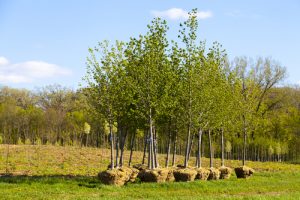
To reduce residential energy consumption, U.S. Sen. Shelley Moore Capito (R-WV) on June 18 introduced a bipartisan bill that would establish a tree planting grant program.
“By strategically increasing the amount of trees planted in our communities, we can improve the quality of our air, increase property values, and reduce residential cooling costs,” Sen. Capito said.
She joined U.S. Sen. Cory Booker (D-NJ) in proposing the Tackling Residential Energy burdens Efficiently (TREE) Act of 2020, which would create a cost-share grant program at the U.S. Department of Energy to provide funding to plant a minimum of 300,000 trees annually in residential neighborhoods.
If enacted, the bill would support meeting the goal of the One Trillion Trees global initiative, announced earlier this year by President Donald Trump to restore one trillion trees by the year 2050, according to a bill summary provided by Sen. Capito’s office.
The TREE Act’s grant program would prioritize projects that provide the largest potential reduction in residential energy consumption for households with a high-energy burden; projects located in a neighborhood with lower tree canopy cover and higher maximum daytime summer temperatures; projects located in a neighborhood with high amounts of senior citizens or children; projects that will collaboratively engage neighbors and community members closely affected by the tree planting, according to the text of the bill. Projects that would employ a substantial percentage of a local workforce, with a focus on engaging unemployed and underemployed persons, would also be prioritized.
“Connecting this program to our energy providers, nonprofits and state and local governments will enable us to work together to reduce our carbon emissions and provide significant benefits to our economy,” said Sen. Capito. “West Virginia is known for being wild and wonderful, and I want to ensure that reputation is preserved by planting trees for future generations that will enjoy all the many benefits of these investments.”



